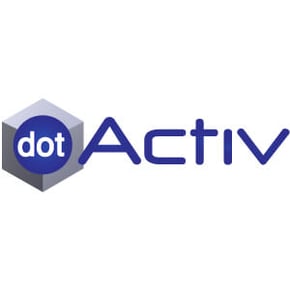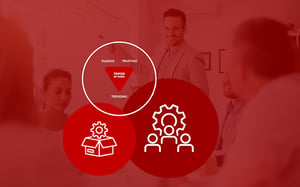Effective team task management is never an easy task. There are so many different factors that you need to balance carefully. Not only do you need to consider the dynamics of your team but it has to fit into your overall business goals. However, if you can manage everything efficiently, you’ll place your business in an optimal position to compete.
More importantly, you’ll ensure that your business becomes a more effective organisation that can succeed.
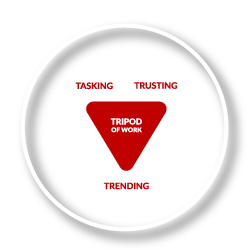
Effective team management begins with the Tripod of Work
As a team leader, you're likely to understand that you need to have solid processes in place to ensure you get the most out of each person in your team and business. That's regardless of how long you've managed people.
For example, you'd need to know how to task, guide, and support your team so that they are as productive as possible. You'd also need to be able to manage team dynamics and conflict confidently to enable everyone to operate as they should at all times. And then there is the point that you need to be empathetic in everything you do, which allows you to foster trust amongst your team.
Through this, you can build an effective team that understands what it needs to do to achieve the expected outputs. More importantly, develop a team that knows how their work contributes to the bigger picture.
So how do you set up these processes? How can you ensure that your team will be productive? Or that they’ll trust you to have their best interests at heart? Simple. You turn to a tried and tested management model such as the Tripod of Work.
Attributed to BIOSS, the Tripod of Work helps managers to be more effective leaders. With it, you have a way to create the best possible conditions for employees to work and perform in their specific role. That’s achieved through three activities: Tasking, Trusting and Tending.
We'll touch on these activities in more detail below.
For now, it's worth pointing out that they are best presented in a triangle to display that these activities are connected. Each activity is a point on the triangle, and when balanced, you'll have the optimal conditions for your team to perform as they should.
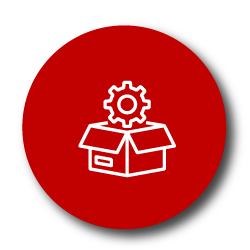
Unpacking the Tripod of Work
As already stated, effective team task management can help your business to become a more effective one. We also stated that this is best achieved through the Tripod of Work. If you and the managers within your business can perform the activities found within this model, you’ll be better positioned to succeed.
Tasking
The first activity - tasking - is the process of sharing information and purpose. Here, it’s about explaining to your team what work needs to be done, establishing deadlines for the work to set expectations as well as defining the quality of work that you require.
Of course, delegating tasks to others can lead to questions about control and trust. This is where the balance needs to be found. If you can perfect the balance between Tasking and Trusting, for example, you can define the limits for judgement.
As for key principles of Tasking, here are a few worth noting:
Firstly, when tasking, the purpose is to seek alignment between yourself and your team on the work tasked out. Everyone involved must understand the details of the given task or project. Secondly, you need to be specific about what you expect from each person within the tasked team as well as the timeframes for each task. The last thing you'd want is to set expectations that are too high. Or unachievable timeframes.
This leads to a third principle: it's important that as someone intent on effective team task management, you need to understand the capabilities of your team. Do they have the skills required to do a task that you've given to them? Are they knowledgeable enough to complete the task to your satisfaction? Where do they need assistance to complete the task?
Throughout any tasking activity, it's up to you to understand the strengths and weaknesses of your team.
Trusting
Alongside Tasking is the activity of Trusting.
Trusting is all about entrusting the people in your team with the responsibility of using their judgement to achieve the outputs that you expect of them.
Here, it's about ensuring that your team knows and feels that you trust them to get the work done on time and at the high standard that you expect. This allows for a team that can work independently and confidently.
You only need to listen to Peter Drucker, author of Managing for the Future to further entrench this idea.
“The leaders who work most effectively, it seems to me, never say 'I.' And that's not because they have trained themselves not to say 'I.' They don't think 'I.' They think 'we'; they think 'team.' They understand their job is to make the team function. They accept responsibility and don't sidestep it, but 'we' gets the credit ... This is what creates trust, what enables you to get the task done.”
With trust, you can expect a pleasant workplace, a group that all shares the same vision, fewer office politics and more authenticity.
Of course, there is the opposite side of this - when trust becomes a liability. When it does, you can expect problems such as a dysfunctional work environment, hidden agendas, unhappy workers and more. And each problem can affect multiple areas of your business.
For example, any hidden agendas can affect the relationships in your business. An issue such as micromanagement can affect relationships as well as any work processes. Meanwhile, a toxic environment can affect your vision and leadership.
As for the balance, we'd already mentioned balancing Tasking and Trusting, so let's consider the connection to Tending. The perfect balance between Trusting and Tending allows for a sense of coherence that individuals need to sustain their belief that the work they do is critical.
Tending
The third activity that makes up the Tripod of Work is Tending.
Tending refers to the process of monitoring work without getting too close or interfering. As a manager, you would still want to ensure that your team completes the work you've set out for them. However, you don't want to appear as if you don't trust them.
Of course, you also need to ensure that the work that your team does remains relevant and in line with the goals of your company. This is especially true if you’re currently in a changing environment where any work scoped out needs to be redefined.
As for finding the balance, let's consider the connection between Tending and Tasking. Tasking and Tending ensure constant review. Since you have set a deadline for the completion of a task, you can then keep in touch with your team and continuously review the work. Where necessary, you can provide input and renewed direction.
There are also a few key principles when it comes to Tending. We'll touch on just two.
Firstly, you must ensure the people in your team understand that you don't see them as just numbers or faces. Remember, the balance between Trusting and Tending where your team needs to know that the work they're doing is critical to your business.
Secondly, there needs to be continuous communication throughout the business. That includes from top management down or the bottom up as well as across teams. In this instance, cross-functional management communication is a boon since it allows for more success.
Instead of working in silos, you can ensure that all teams across your business are aligned and pulling the same direction.
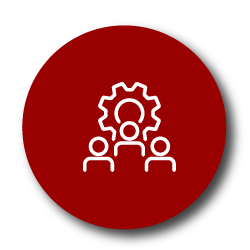
How the Tripod of Work works for your business
By applying the activities found in the Tripod of Work, you can ensure that you create a business environment where you can complete work on time. What's more, you can ensure transparency, accountability and effective collaboration.
1. You can track the progress of all work across your business
As already mentioned, Tasking is all about being specific about your expectations and time frames. That means that if you want to ensure success, you need a way of tracking any work progress from beginning to completion.
That comes with specialised task management software, build to allow for the creation and assignment of tasks to your team. It allows you to better prioritise work and manage the even distribution of work across your teams.
Of course, this doesn't only apply to the Tasking activity of the Tripod of Work. The ability to track the progress of all work also filters into Trusting and Tending activities.
Let’s say, for example, you’ve tasked someone to complete a specific project. It could be a new store opening or you simply need to set up contracts for a new client. As part of this project, you’ve set the tasks and deadlines. You’ve entrusted the person tasked with completing the project on time. If they know that you trust them to complete the work to the standard that you expect, they're more likely to deliver as expected.
You can, of course, tend to the project if the scope changes. Either way, having the ability to track work progress, whenever you want, allows you to focus on other aspects of your business.
2. Team task management allows for transparency and accountability
A result of tasking out work means that everyone will know what is expected of them. Deadlines are in place so there should be no miscommunication. This opens the door for transparency and accountability.
Let’s say, for example, that you want to follow up on a project that you set up a week ago. Because you have set up detailed tasks within that project, you’ll know who to speak to about a specific part.
In truth, if the channels of communication are open - which they should be - you shouldn’t need to follow up but expect constant feedback about the task from the person overseeing the project and how it’s progressing.
Here is where Trusting activity comes into play. If you have built a team based on trust and empathy, your team will be happy to share progress and turn to you for advice. They’ll take pride in their work, knowing that what they’re doing is critical for the success of the business.
And then, if you need to guide the work in a different direction, there won’t be as much of a push back because they see the bigger picture and know that it’s not personal but just a way to improve the business.
3. You can introduce and improve collaboration opportunities
The fact that you can break up a project into smaller tasks and distribute these amongst a team allows you to improve collaboration opportunities.
This is key for a few reasons.
By getting everyone involved, you can ensure increased ownership of a given project. More people have a vested interest in the project succeeding.
Also, it makes for a stronger business. Let’s imagine you need to complete a major project that requires input from multiple departments in your business. By having a cross-functional management team that distributes this work, you’ll have the opportunity to receive insight from multiple stakeholders and angles.
If we consider specialised software, functionality allows for easy collaboration. For example, you could set dynamic tasks with checklists, collaborate with comments, file attachments, and set owners, assignees and observers to ensure everyone is aware of what’s going on at any time during the work.
Conclusion
Activ8 is team management software designed for retailers, suppliers and professional service firms who need to manage their teams across multiple work locations. With Activ8 software, you can drive transparency, accountability and structured management across your teams when transitioning to the remote work model.
Sign up to Activ8 here and you’ll get free and unlimited access to the platform for the first four months. Your first 20 users are free ongoing.
